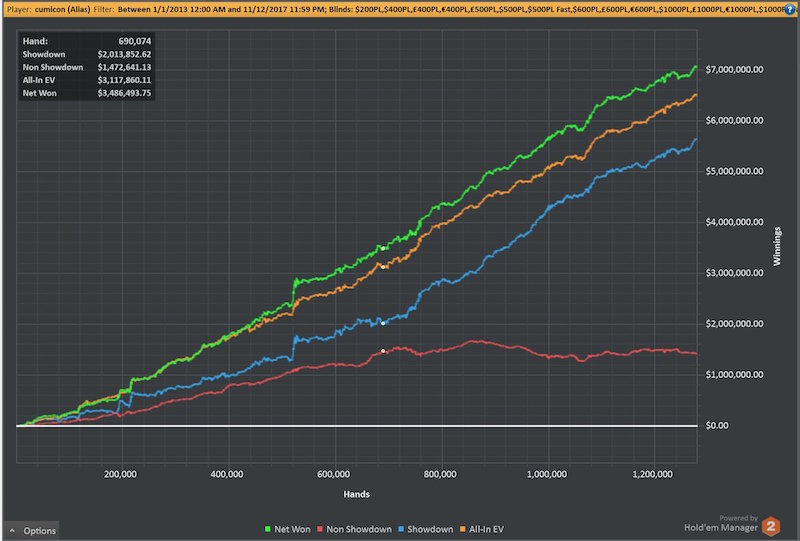If poker has taught you any life lessons it should be the importance of having a big sample size before you can prove anything.
One of the real gifts poker has given me is that it has been a great jumping off point to learn things from other disciplines like economics, AI, psychology and Game Theory. So here is a series of articles where I bring some of the most interesting things I have learned from other subjects outside of poker which are applicable in this game we know and love.
If you have been around poker (and PokerStrategy.com) for a while you definitely know The Law of Large Numbers, but it’s good to put a name to a concept and develop a rock solid understanding of it, because it is vital for the game (and life).
The Law of Large Numbers is a probability theory, which states that the more trials you have of something, the closer your average result should get to the expected value. So for example, assuming it is a normal coin then the expected value of flipping it and getting heads should be 50/50. However, if you flip it ten times the chances of you getting exactly five heads and five tails is very unlikely. If you flip it 1,000 times, then what you do get should be much closer to half of each:
Not understanding The Law of Large Numbers leads to a number of cognitive biases including Gambler’s Fallacy and Selection Bias. You are going to put way too much stock in a short term series of results, even though in the grand scheme of things they are just random.
Sick sample size Bro

The applications to poker are obvious. In fact in poker we tend to mock any evidence we are presented with that doesn’t come with a large sample to back it up. If your friend thought he could go professional because he has had a big winning month of 4,000 hands you would hopefully talk him out of it (but if he was a solid winner over 400,000 hands it would be very different). A player winning one single tournament should never be considered one of the greatest, but a solid ROI after thousands of tournaments is something to be proud of.
In poker we are all probably guilty of overvaluing the players who crush Super High Roller tournaments, because while they are growing in popularity, ultimately they are a small sample of events. It’s only because we know how good a player has to be to even play in one of these events that we can justify fawning over a handful of players who do well in a dozen 40-runner tournaments in a year.
Poker players’ insistence on big sample sizes has really helped me outside of poker. For example, when I see an advert on TV which makes a claim such as ‘8 out of 10 denists recommend this toothpaste’ then see in the small print that it was based on a sample of 147 people, I tend to ignore it. I read a lot of psychology books and while they are fascinating a lot of the research is based on very small samples of volunteers, so you have to take them with a pinch of salt (but when it is in the thousands and the tests have been replicated, it is very reliable indeed).
Seeing the long term
Beyond avoiding obvious biases, The Law of Large Numbers is very helpful for coping with good and bad variance. If you lost all your most recent flips with Ace King it can be easy to feel the deck is stacked against you, but if you have the benefit of a PokerTracker database with hundreds of thousands of hands you can look at a graph that visualises how it’s a small blip in the grand scheme of things.

I also quite enjoy looking at database breakdowns for really specific things like how much money you have won with particular hands or from different positions. Yes Pocket Fours might be flopping a lot of sets for you this month but if you look at how it does over a year or more, you’ll probably find Pocket Fives have made you more and Pocket Sixes made more than Pocket Fives. Likewise, the Button is where you make the most money, the Small Blind the least, and so on.
If The Law of Large Numbers seems novel to you, spend some time this month looking for how it applies to your own poker. If you already have a solid understanding of it in the game, look for examples of it in real life. It really takes a lot of the emotion out of everything from money decisions, purchasing products, politics and much more.
What theories from outside of poker have helped your game? Let us know in the comments.
Related articles
source https://casinonewsblogger.com/the-law-of-large-numbers/

No comments:
Post a Comment